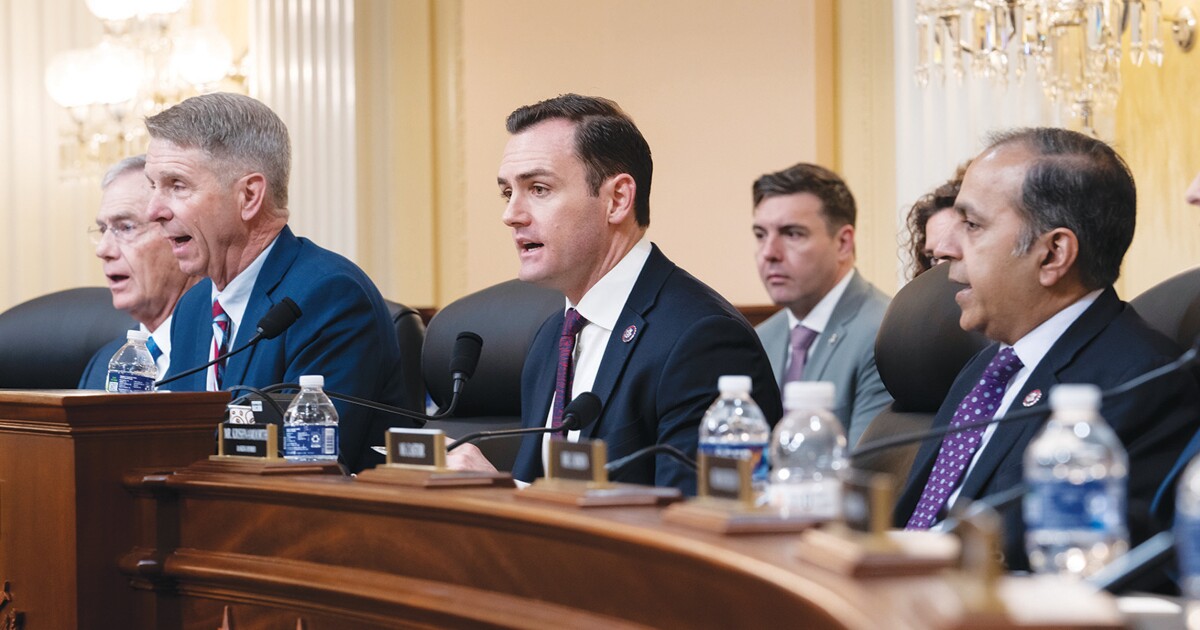

With tensions between the United States and China in their worst state since the countries established diplomatic ties in 1979, members of the House Select Committee on Strategic Competition have had no shortage of study material in the panel’s first six months.
Tensions rose in February over a Chinese surveillance balloon that the U.S. government ultimately shot down after it traversed the continental United States. There have also been U.S.-led restrictions on China’s access to advanced computer chips and rounds of diplomatic one-upmanship over the status and security of Taiwan.
SUPREME COURT CHECKS BIDEN’S OVERREACH ON STUDENT LOANS
And while the House committee focused on China is still very much in the midst of its work, it’s clear the threat posed by the Chinese Communist Party toward the United States is immediate and direct, lawmakers from both parties say.
“You have a bipartisan group of members saying that the Chinese Communist Party presents not just a distant ‘over there’ threat, but a ‘right here at home’ threat,” Rep. Mike Gallagher (R-WI), the committee’s chairman, told the Washington Examiner in an interview. “That’s a direct threat to American sovereignty, and then, we’re not moving quickly enough to address that fact.”
Bipartisan committee approach prevails
The House Select Committee on the CCP has 13 Republican and 11 Democratic members. House Speaker Kevin McCarthy (R-CA) formed the panel early in the 118th Congress as a select committee, with GOP members appointed by him and Democrats picked by House Minority Leader Hakeem Jeffries (D-NY).
At the time, not all lawmakers liked the idea of a special panel to study threats by China to the U.S. Rep. Judy Chu (D-CA), who chairs the Congressional Asian Pacific American Caucus, opposed the creation of the committee, which passed the House 365-65 on Jan. 10. Chu, in a House floor speech, warned that the panel “should not be used as an open invitation to traffic in blatant xenophobic anti-China rhetoric that can result in physical violence against Asian Americans.”
But once in business, the committee moved forward quickly. And six months in, lawmakers agree that decisive and strategic actions toward China are needed, and quickly, in order to ensure America’s long-term standing globally. The committee has covered an array of topics ranging from China’s desire for unification with Taiwan, the intertwined economic relationship between Beijing and the Western world, the CCP’s harassment of dissidents outside of China, as well as human rights violations, among a litany of other issues.
“I think the fact that in bipartisan fashion we’ve been expressing concerns about our economic dependence on China, and the need to, and had a frank conversation with the business community, the finance community, corporate America, the entertainment industry about the coercive leverage that the Chinese Communist Party exercises over them has been an important aspect of the committee’s work,” Gallagher said.
Its bipartisan comity stands in stark contrast to so much else in the House, where Republicans hold a narrow 222-213 edge.
The panel’s top Democratic member, Rep. Raja Krishnamoorthi (D-IL), emphasized the economic threats posed by China.
“I have a huge concentration of small businesses and entrepreneurs in my district. And for obvious reasons, they feel intense competition from PRC or Chinese companies, either are exporting here, or competing with them abroad in other markets,” Krishnamoorthi told the Washington Examiner.
Threats on multiple fronts
The committee has held prime-time hearings, including one that featured testimony from Uyghurs who detailed alleged human rights abuses committed against the minority Muslim population in Xinjiang, an autonomous region, by the Chinese government. Lawmakers have also traveled within the U.S. to meet with various industry, entertainment, and foreign leaders.
The panel also conducted a war game scenario focusing on how the U.S. would fare if the Chinese military were to make an attempt to seize Taiwan by force, which it considers a renegade province.
“A lot of what we did early on was to dig into the issue of near-term deterrence over Taiwan, including taking the committee out to California to meet with President Tsai [Ing-wen],” Gallagher said of the Taiwanese leader.
“I’m not sure this has ever been done before in Congress, with members of the committee regarding a scenario of conflict with China over Taiwan, and that then informed our first major policy report, which we call ’10 For Taiwan,'” Gallagher said. “Ten steps we can take in this Congress in a bipartisan fashion to enhance near-term deterrence and thereby prevent a war with China over Taiwan.”
The committee, in late May, adopted those 10 bipartisan policy recommendations for Congress to pass regarding U.S. support to Taiwan, and seven of them were included in the initial draft of the fiscal 2024 National Defense Authorization Act.
Some of the recommendations include an independent review of the DOD’s implementation of its Pacific Deterrence Initiative, a requirement for the secretary of defense to engage with the Ministry of National Defense of Taiwan, a requirement for a plan to integrate the Long Range Anti-Ship Missile with legacy aircraft fleets to enhance the ability of existing platforms to sink PLA ships, among others.
They have sought to convey the urgency of their work to the public by traveling to relevant locations for the subject. Members traveled to Manhattan, where an underground Chinese police department operated unofficially to threaten dissidents. And more recently, members met with automobile companies in Detroit, Michigan, and with retail brands that have factories in China to understand the significance of their dependence on China.
The Chinese spy balloon that flew over the continental United States in early February “has really elevated the concern and conversation around the [Chinese Communist Party] and President Xi [Jinping’s] regime for the American people,” Rep. Ashley Hinson (R-IA), a member of the committee, told the Washington Examiner.
Hinson said the committee should focus on agricultural intellectual property theft because China is “trying to not only undermine our safety and security militarily, but also our food supply.”
The committee’s work comes amid warnings by Defense Department officials over what they’ve seen as an increasingly aggressive Chinese military for more than a year, including dangerous intercepts of U.S. aircraft and naval vessels in the Pacific region. Top Chinese military officials have given their U.S. counterparts the silent treatment in the months since the spy balloon incident, which U.S. officials have warned increases the likelihood of an unintended accident.
Top officials from President Joe Biden’s administration have traveled to China recently in efforts to ease tensions. On July 6, Treasury Secretary Janet Yellen traveled to China for a three-day trip, a high-stakes visit that is intended to help stabilize the fraught relationship between the world’s two largest economies, while Secretary of State Antony Blinken went to Beijing earlier last month. Blinken was initially scheduled to travel to China in February, a trip postponed by the spy balloon episode. His trip coincided with the news that Beijing updated a surveillance facility it has in Cuba, about 100 miles off of Florida’s coast, in 2019, while the two countries are negotiating the establishment of a new joint military base, the Wall Street Journal reported.
Key focus for Chairman Gallagher
Gallagher has requested explanations from Director of National Intelligence Avril Haines and Secretary of Commerce Gina Raimondo regarding Beijing’s involvement in Cuba.
The committee’s work is continuing in the second half of July, and Gallagher has become identified with the select committee more than any other lawmaker. First elected to Wisconsin’s 8th Congressional District in 2016, Gallagher declined to run for Senate in 2024 due to his work leading the committee.
CLICK HERE TO READ MORE FROM THE WASHINGTON EXAMINER
“I just think, by pouring all my energy and limited intellect into this question of how we deter a hot war in the near term, and win a cold war over the long term, is my best use of the country and that’s the opportunity I have with this gavel,” said Gallagher, 39, a Marine Corps intelligence officer on active duty from 2006 to 2013, with service in Iraq.
“We’re in the window of maximum danger with respect to Taiwan. That’s the thing I’ve been saying for five years,” said Gallagher, a Princeton graduate who holds a Ph.D. in government and international relations from Georgetown University, among other degrees. “The question is what can we do, even in divided government in the next two years, to put us on a path to peace in the near term and winning this competition over the long term? And that I feel like I could do this, or at least contribute in a small part to that effort on this committee.”




